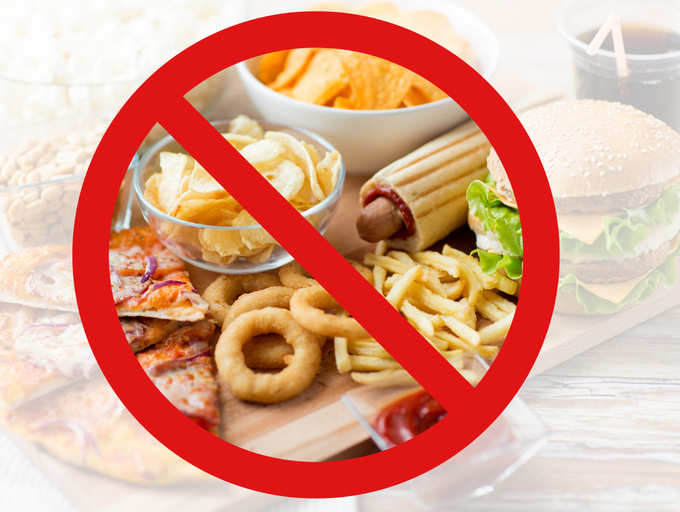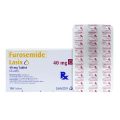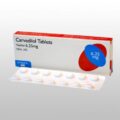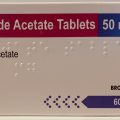Carvedilol is in a class of medications called beta-blockers. Carvedilol is used to treat high blood pressure and heart failure. It is also used after a heart attack to improve the chance of survival if your heart is not pumping well. Lowering high blood pressure helps prevent strokes, heart attacks, and kidney problems.
Carvedilol works by blocking the action of certain natural substances in your body, such as epinephrine, on the heart and blood vessels. This effect lowers your heart rate, blood pressure, and strain on your heart.
High blood pressure is a common condition and when not treated, can cause damage to the brain, heart, blood vessels, kidneys and other parts of the body. Damage to these organs may cause heart disease, a heart attack, heart failure, stroke, kidney failure, loss of vision, and other problems. In addition to taking medication, making lifestyle changes will also help to control your blood pressure. These changes include eating a diet that is low in fat and salt, maintaining a healthy weight, exercising at least 30 minutes most days, not smoking, and using alcohol in moderation.
How should Carvedilol be used?
Carvedilol comes as a tablet and an extended-release (long-acting) capsule to take by mouth. The tablet is usually taken twice a day with food. The extended-release capsule is usually taken once a day in the morning with food. Try to take carvedilol at around the same time(s) every day. Follow the directions on your prescription label carefully, and ask your doctor or pharmacist to explain any part you do not understand. Take Carvedilol exactly as directed. Do not take more or less of it or take it more often than prescribed by your doctor.
Swallow the extended-release capsules whole. Do not chew or crush the capsules, and do not divide the beads inside a capsule into more than one dose. If you are unable to swallow the capsules, you may carefully open a capsule and sprinkle all of the beads it contains over a spoonful of cool or room temperature applesauce. Swallow the entire mixture immediately without chewing.
Your doctor will probably start you on a low dose of Carvedilol and gradually increase your dose to allow your body to adjust to the medication. Talk to your doctor about how you feel and about any symptoms you experience during this time.
Carvedilol may help to control your condition but will not cure it. Continue taking Carvedilol even if you feel well. Do not stop taking Carvedilol without talking to your doctor. If you suddenly stop taking Carvedilol, you may experience serious heart problems such as severe chest pain, a heart attack, or an irregular heartbeat. Your doctor will probably want to decrease your dose gradually over 1 to 2 weeks. Your doctor will watch you carefully and will probably tell you to avoid physical activity during this time.
Foods To Avoid When Taking Carvedilol
Taking a medicine at the same time you eat can cause your body not to absorb the medicine. Or certain foods may delay or decrease the absorption of the drug.
Some medicines cannot be taken with certain types of food. The food can cause a reaction that changes the effect of the medicine. It also can create or heighten side effects.
If you are taking Carvedilol, you should avoid potassium, sodium, calcium and magnesium-rich foods. This combination may reduce or negate Carvedilol’s effect in reducing blood pressure. You should also avoid Grape fruit because the interaction of grapefruit juice with Carvedilol increases the blood levels of the drug.
Carvedilol oral tablet can cause several types of side effects, including drowsiness. Don’t drive, use machinery, or perform activities that require alertness until you know how this drug affects you.
What are the side effects of Carvedilol?
More common side effects
The more common side effects that can occur with carvedilol oral tablet include:
- dizziness
- unusual tiredness
- low blood pressure
- diarrhea
- high blood sugar
- lack of energy or weakness
- slower heart rate
- weight gain
- changes in sex drive or performance
- dry eyes
- dry, itchy skin
- headache
- nausea.
If these effects are mild, they may go away within a few days or a couple of weeks. If they’re more severe or don’t go away, talk to your doctor or pharmacist.
Serious side effects
Call your doctor right away if you have serious side effects. Call 911 if your symptoms feel life-threatening or if you think you’re having a medical emergency. Serious side effects and their symptoms can include the following:
- Allergic reactions. Symptoms can include:
o skin rash
o hives
o swelling of your face, lips, or tongue
- Changes in your heart rate. Symptoms can include:
o irregular or slow heart rate
o feeling dizzy or fainting
- Heart problems. Symptoms can include:
o breathing problems or shortness of breath
o weight gain
o swollen legs, ankles, or arms
o chest pain
- Liver problems. Symptoms can include:
o dark-colored urine
o vomiting
o yellowing of your skin or the whites of your eyes
- Eye problems. Symptoms can include:
o change in eyesight
o changes in how contact lenses feel in your eyes
- Urinary problems. Symptoms can include:
o being unable to pass urine
o change in how much urine you pass.





